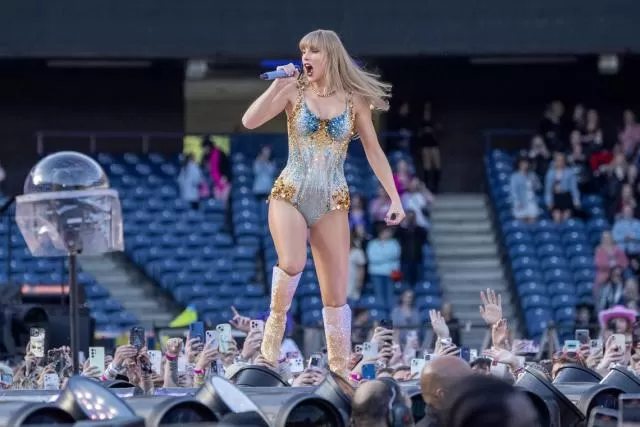Taylor Swift’s $360 Million Masterstroke: Reclaiming Her Music Legacy

In a landmark move that has sent shockwaves through the music industry, Taylor Swift has reportedly purchased the master recordings of her music catalog for approximately $360 million, according to Billboard. This acquisition, one of the most significant artist-driven deals in recent history, grants Swift full ownership and control over her creative output, marking a triumphant chapter in her ongoing quest to reclaim her artistic legacy. The deal underscores her business acumen and sets a precedent for artists seeking autonomy in an industry often fraught with complex ownership disputes.
The Backstory: A Battle for Control
Swift’s journey to reclaim her masters has been a highly publicized saga, rooted in her early career with Big Machine Label Group. Signed to the label at just 15, Swift released six blockbuster albums—Taylor Swift (2006), Fearless (2008), Speak Now (2010), Red (2012), 1989 (2014), and Reputation (2017)—that collectively sold millions and earned critical acclaim. However, the masters of these albums were owned by Big Machine, a common industry practice that often leaves artists with limited control over their work.
In 2019, the situation escalated when Scooter Braun’s Ithaca Holdings acquired Big Machine, including Swift’s masters, for a reported $300–$330 million. Swift publicly expressed her frustration, claiming she was not given the opportunity to purchase her masters herself and criticizing the deal for handing control to parties she felt were at odds with her interests. The masters were later sold to Shamrock Capital, a private equity firm, in 2020 for an estimated $405 million, further complicating Swift’s path to ownership.
Undeterred, Swift embarked on an ambitious project to re-record her early albums, releasing “Taylor’s Version” of Fearless, Red, Speak Now, and 1989 between 2021 and 2023. These re-recordings, which she owns outright, allowed her to redirect fan and commercial support to versions she controls, diminishing the value of the original masters. The success of these re-recordings—bolstered by new tracks, fan loyalty, and Swift’s global influence—demonstrated her ability to reshape the narrative around her catalog.
The $360 Million Deal
According to Billboard, Swift’s purchase of her masters from Shamrock Capital for roughly $360 million is a culmination of her strategic efforts. The deal, finalized in late 2024, covers the master recordings of her Big Machine-era albums, giving her unprecedented control over how her music is used, licensed, and monetized. At the time of the purchase, her catalog was valued at approximately $450 million, reflecting its enduring commercial and cultural significance.
This acquisition is a financial and symbolic victory. Owning her masters allows Swift to license her music for films, commercials, and streaming platforms without third-party approval, ensuring she reaps the full financial rewards. It also aligns with her broader mission to advocate for artists’ rights, a cause she has championed publicly since her dispute with Big Machine began.
Why It Matters
Swift’s purchase is more than a business transaction; it’s a cultural moment. The music industry has long been criticized for practices that favor labels and investors over artists, particularly when it comes to master ownership. By securing her masters, Swift has not only reclaimed her life’s work but also set an example for other artists to follow. Her journey highlights the importance of understanding contracts, leveraging fan support, and using creative strategies like re-recordings to regain leverage.
The deal also underscores Swift’s unparalleled market power. Her catalog, spanning pop, country, and indie-folk, remains a juggernaut, with hits like “Love Story,” “Shake It Off,” and “Blank Space” continuing to dominate streaming platforms. The $450 million valuation of her catalog reflects not only its historical success but also its future earning potential, driven by her global fanbase and savvy marketing.
The Bigger Picture
Swift’s acquisition comes at a time when artists are increasingly prioritizing ownership. High-profile cases, like Kanye West’s push to reclaim his masters or Beyoncé’s control over her creative output, signal a shift toward artist empowerment. Swift’s success could inspire a new generation of musicians to negotiate better deals early in their careers or pursue alternative paths to ownership.
Moreover, the deal has implications for the music industry’s financial landscape. Private equity firms like Shamrock have increasingly invested in music catalogs as stable, high-yield assets, with artists like Bob Dylan and Bruce Springsteen selling their masters for hundreds of millions. Swift’s purchase flips this trend, showing that artists with sufficient resources and influence can reverse the flow of ownership back to themselves.
What’s Next for Swift?
With her masters now in hand, Swift’s creative and commercial possibilities are boundless. She can explore new licensing opportunities, create deluxe editions of her albums, or even integrate her music into innovative projects like virtual reality experiences or film productions. Her re-recordings, which have already surpassed the originals in popularity, will likely continue to thrive, further cementing her control over her legacy.
Swift’s move also strengthens her advocacy for artists’ rights. She has used her platform to speak out about fair compensation, transparency in contracts, and the need for systemic change in the industry. By securing her masters, she has turned her words into action, proving that artists can challenge entrenched power structures and win.
Conclusion
Taylor Swift’s $360 million purchase of her masters is a defining moment in her career and a beacon for the music industry. It represents the culmination of years of determination, strategic planning, and an unwavering connection with her fans. At a time when the value of music is increasingly quantified by streaming numbers and investment portfolios, Swift’s victory reminds us that art is deeply personal—and worth fighting for. As she moves forward with full ownership of her catalog, one thing is clear: Taylor Swift is not just writing history; she’s rewriting the rules.






